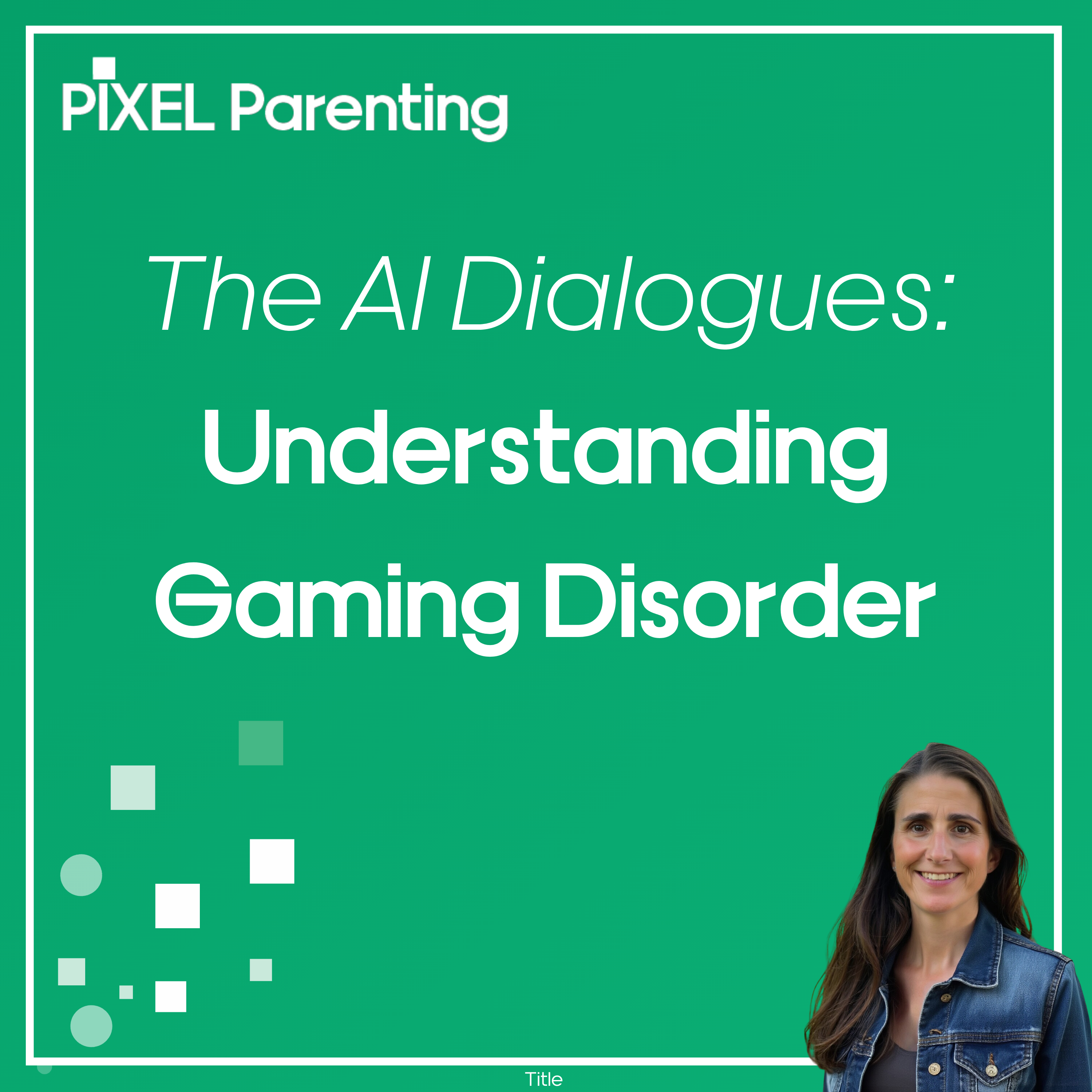[00:00:00] Hello again and welcome to part two of our video game series on pixel parenting. I'm Patricia Kengas and in this episode I'm shifting the focus to the practical side. How should I introduce and manage video games at home? I'll share practical strategies and tools to introduce gaming at home.
[00:00:16] Before I dive in, I also want to clarify that any mention of video game titles or companies is purely non commercial. I'm not affiliated with these companies. It's just my personal experience and recommendations as a gamer and as a parent. Now, now, let's get started. Okay, so you've decided it's time to introduce video games. But how do you do it in a way that's fun, educational and doesn't lead to endless battles over screen time? So before bringing video games to your house, I highly recommend you make a written contract with your kid. A simple written contract. Nothing. It sounds very fancy, but it is not. Just sit down and agree on gaming times, homework, slots and general rules regarding gameplay. How is it going to look like? What is it about? How are you going to choose the games? Anything you want to talk, have a conversation and put in writing the decisions you make about it. This is important because then you can go back and check what you said. You can find game contracts in commonsensemedia.org for different age ranges. Making this contract helps to set expectations and gives the kids a sense of ownership of their time. So create the schedule with them. Also choose age appropriate games. In the US games are rated according to the ESRB and in Europe rated according to pegi. But sometimes the rating may not match what your kids interest or needs. So I highly Recommend you use commonsensemedia.org again to check content appropriateness and age appropriateness at Common Sense. For a specific game you can read their official rating, but there are also parent comments and children's comments that are very very useful so you can understand what to expect of the game.
[00:02:02] Another thing that I highly recommend and research also says that is very beneficial, is to play together. Especially for younger children, parental involvement is key. Playing together turns gaming into a bonding experience and also lets you monitor the content firsthand.
[00:02:21] Tools you may find useful, although not enough, are parental controls within the consoles. Most gaming consoles and devices have built in parental controls use them. You can set daily limits or weekly limits, restrict content and track playtime. The system will help you enforce the rule. For example, if you set a 30 minute limit, it will pause the game. That doesn't mean that your child is going to be willing to stop to play, but at least you can have a conversation and it raises awareness on how much time has passed by. Commonsensemedia.org has also great resources and guides for parental controls. You can check. You can go into commonsensemedia.org and then just in the search bar you type parental controls. And there are many guides for different devices, different ages. So there's good material in there. So this leads me to the communication piece Communication with your children is key. Keep the conversation going Talking to kids about their gaming experience is important. What do they like? What do they love about it? What was their favorite adventure? What characters do you like to play? What strategies are they doing? Use those chats to address any concerns you might see without judgment, an honest conversation and honest interest on what your children like about their gaming experience. And you may not understand a word they're saying or you may think that it's really boring. That is okay, it's normal. Just keep asking questions and show interest. It doesn't have to be a very long conversation. They just need to feel that you're involved and engaged and you may actually learn some things and you may learn how they think about it. You may discover something new about your child. So I welcome you to have those conversations even if you feel you don't understand what they're talking about.
[00:04:13] Another tool you may find useful is having a gaming journal. So have your child track their playtime, their favorite games, what they like about the game, what they didn't like about the game on that specific day, and how they feel after playing.
[00:04:27] It's a good way to build self awareness and finally encourage balance. So gaming should be just one part of your child's life. Make sure they're also getting outside, doing homework, hanging out with friends, having family time, developing other hobbies, etc. Talk to them about why they cannot play video games all day. I actually recommend discussing concepts like dopamine to help them understand how their brain reacts to the gaming experience. And this also makes the self regulation much easier because it makes it a little bit more tangible.
[00:05:03] That said, I'm going to share what we do in my household. This might work for you. This may not. There's not one size fits all. Even though my husband and I love playing video games, we haven't introduced video games in our household yet. Just for a reminder, they're 6 and 8 years old right now. We prefer that they learn to embrace the moments of boredom. This builds a lot of skills. I've talked about this in another episode so they can explore their imagination and creativity through activities like gardening, building Legos, reading, playing with Amazon card boxes, and discovering how the physical world works. We truly believe that there is plenty of time for gaming later in life. At home we also have conversations about how our brain works. We talk about dopamine and how sleep affects us, why nutrition is important. So we have a little bit of geeky conversations about the brain. We talk about what things that keeps us healthy, how about balance, etc. Something that helps not to introduce video games at home at this point is we have peer pressure. They're not strongly demanding video games, so with little peer pressure, they naturally gravitate towards exploring other things. If you're interested, you can find my favorite children's book on the brain and other
[email protected] in the tabs Resources.
[00:06:21] I find that talking about the brain makes the topic much tangible. It's not just me as a police saying no video games, no, no, no. I am also explaining the why. And the why has science behind it. So I like explaining to them the science behind the why. In our household we make certain decisions.
[00:06:42] So as I said, right now we don't have video games at home. Another reason is because even though it might seem like a hands off activity, it actually requires more more supervision than just letting them play outside or with Legos.
[00:06:58] And since my daughters are still young, I will need to plan, set limits, talk about the contracts and monitor whatever they're doing and supervise, which is a lot of work. So for now I'd rather spend that time engaging with them in other ways. But when they're older, we're excited to introduce gaming and enjoy it together as a family. Okay. And at this point I'm gonna pause for a little bit to make two points.
[00:07:24] One, it's not just about time, it's about what they're not doing while when playing video games. So it's not just about how long your kids play or what games they choose, it's about what they're not doing when playing video games. So keep in mind that they need to do homework, exercise, face to face socializing, and also develop new hobbies. Video games cannot take over all the free time. Research shows that excessive gaming can impact physical health, grades and social skills. So keep gaming as one piece of the puzzle.
[00:08:01] Another point I want to make is regarding coplay. Yes, one of the best strategies is co playing, sitting down and playing together with your child. This not only makes games more fun, but also allows you to model healthy habits. So setting clear limits for both you and your kids is key. Because even though sometimes you want. You are going to want to keep playing, especially when you're immersed in an epic quest and you really need to find that object. The fact that you can put down the controller to go have dinner or do homework, or work, or go on a family walk, it reinforces that gaming is part of our day, not the whole day. And it teaches everyone that the balance is key.
[00:08:47] This is hard because it means you have to put down the controller when you're in the middle of an epic quest. Time limits are for adults to when co playing with your children.
[00:08:59] So in this episode I've mentioned a few times the word dopamine. Let's get scientific for a second. When we play, your brain releases dopamine, which is a key neurotransmitter. Often called the feel good chemical, Dopamine plays a vital role in how we experience pleasure and reward. When you engage in enjoyable activities like playing a video game, your brain releases the so called dopamine. When does it do it? In every level up every win or new item. That feels rewarding. And this reinforces the playing behavior. You want to keep playing to get more of that. Another level, another item, another Cha Ching achievement. So whatever it is you are aiming for, you want that experience over and over again because you want the dopamine release. But if this dopamine loop becomes too frequent or intense, it can create strong habits and make it hard to stop. Basically, too many dopamine hits can make everyday life activities feel less exciting. Life can become boring.
[00:10:04] So you don't want this for your child, right? So what can you do? First? You can set boundaries that we've talked about. Stick to those limits. You can watch for red flags. Are they neglecting responsibilities? Are they losing sleep?
[00:10:18] Are they sad? Are they getting cranky? Without games, all of these could signal a problem. And these are just a few. We could get into deeper ones. In another episode you could balance the reward system with other rewards like offer other dopamine boosting activities like sports or art to keep the gaming in check.
[00:10:40] That brings us to the end of part two.
[00:10:44] Playing video games is super fun, but introducing them can be challenging. Remember, it can be done in a mindful way to make sure your children learn how to keep balance in their life. We spoke about resources like Common Sense Media to check for age appropriate games, parental controls and contracts to put in place where rules are agreed upon. We also talked about the fun of Coplay and the importance of role modeling. We spoke about keeping a gaming diary to help with self awareness and sometimes conversations that reminds me of another great resource, the Healthy gamer podcast by Dr. K. He's a psychiatrist that focuses on gaming and is a great resource for gaming and psychology related tips.
[00:11:27] Lastly, but definitely not least, communicate with your children about what they like about their gaming experience. It's okay if you do not understand a word they're saying or if you find it boring. Just ask honest questions and listen.
[00:11:42] Just ask honest questions and listen.
[00:11:49] Building trust when talking tech will not only help you with gaming, but also social media and many other tech conversations. By creating a structure that includes time for homework, physical activity and creative play, you're helping your kids build self regulation skills. Skills that will serve them both in the digital world and in life overall. For more goodies like the gaming Journal and a full list of recommended games and books, visit pixelparenting.org and if you have any questions or game recommendations, please drop a comment with the game's name, the suggested age, and what you enjoy about it. And finally, if you enjoyed this episode, share it with other parents who are exploring similar questions. Thanks for listening. I really appreciate your interest in helping your kids navigate the digital world thoughtfully.


